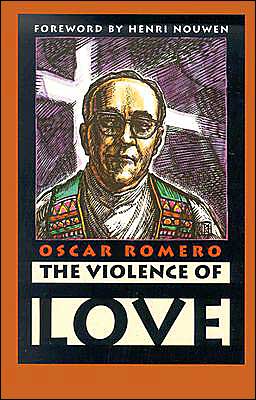

 |

|

The average rating for The Violence of Love based on 2 reviews is 4.5 stars.
Review # 1 was written on 2020-09-08 00:00:00 Sandra Constable Sandra ConstableA convicting read. |
Review # 2 was written on 2011-12-28 00:00:00 Mahesh Nayak Mahesh NayakOscar Romero was a Roman Catholic bishop in El Salvador in the 1980s. When he began his ministry in El Salvador he was a supporter of the political and economic status quo. In the span of three years, as he came into contact with the real, struggling people of his parish, he was transformed into a man determined to speak out against the oppressors and in favor of the oppressed poor who comprised his parishoners. He was publically attacked and slandered during this time, his church was persecuted and burned to the ground, his radio station was attacked, and finally, on March 24th, 1980, he was assassinated. Though many in the American Church remember Romero, if they remember him at all, they remember him as a socialist, a revolutionary, a communist, someone linked up arm-in-arm with the political Marxist revolutionaries and liberation theology of the period in South America. It becomes self-evident, however, upon reading Romero's The Violence of Love, a collection of quotations and exhortations to his church in the few years running up to his assassination, that nothing could possibly be further from the truth. Dozens of times, countless times, innumerable times, Romero makes it very clear he did not support the revolutionary ideology rampant in his country of El Salvador. A typical statement of his on the subject is this: It would be worthless to have an economic liberation in which all the poor had their own houses, their own money, but were still sinners, their hearts estranged from God. What good would it be? There are nations at present that are economically and socially quite advanced, for example those of northern Europe, and yet how much vice and excess! (p. 8 ) As Christians formed in the gospel you have the right to organize and, inspired by the gospel, to make concrete decisions. But be careful not to betray those evangelical, CHristian, supernatural convictions in the company of those who seek other liberations that can be merely economic, temporal, political. (p. 2) Such comments are typical of Romero, whose intention was to overturn the language of his enemies, to confound them by turning their terms against them. We have never preached violence, except the violence of love, which left Christ nailed to a cross, the violence that we must each do to ourselves to overcome our selfishness and such cruel inequalities among us. The violence we preach is not the violence of the sword, the violence of hatred. It is the violence of love, of brotherhood, the violence that wills to beat weapons into sickles for work. (p. 12) By so doing, Romero confused and infuriated his opponents on the right and the left by taking their language - "violence" "liberation," etc. - and using them in new ways that undercut the agendas they intended. He did so with wit and verve, leaving no injustice unturned because it was uncomfortable to expose. No sacred cow was too sacred to get thrown from the temple if it did not serve the Living God. Perhaps most shocking of all is Romero's tone throughout the book. He is not the furious prophetic rebel shouting down the tyrants with vein-popping jeremiads, as we might be forgiven for expecting. He simply said it, simply spoke the truth, and the perpetrators of violence and hatred went apoplectic. Perhaps it was precisely this tone of declaration, not of raging against the system, that terrified and confused them even more than they otherwise might have been. When someone says that something is an offence to the Living God and does so without rage or anger or defiance, but simply states it like a self-obvious truth, it is often more disquieting than all the self-righteous rage in the world. The Violence of Love is unique for another reason. Romero's powerful quotes and statements have been rendered into poetic lines, giving his comments a lyrical, almost Psalmist feel that renders them even more stirring and inspiring. I frequently wanted to underline the best bits, but - much like with Chesterton - I soon found that if I continued to underline the best of the book, I might as well just underline everything. There were some stretches towards the middle that struggled to interest me, but beyond this small quibble (perhaps they are of greater interest to others) the book managed an extraordinary sense of even-ness. There was a flow to it that built nicely and worthy of giving Romero, giving us a spectacular cross-section of this little-known martyr of God's Church. |
CAN'T FIND WHAT YOU'RE LOOKING FOR? CLICK HERE!!!